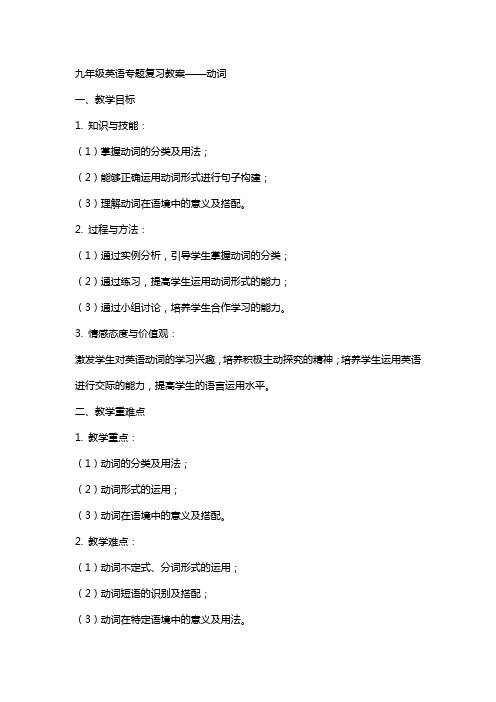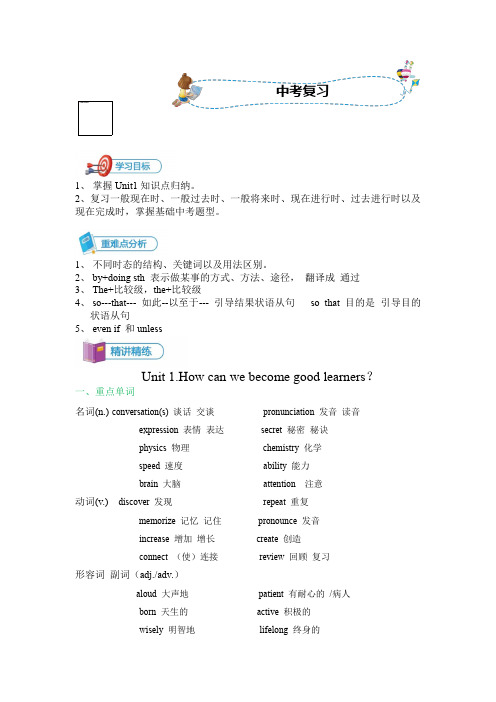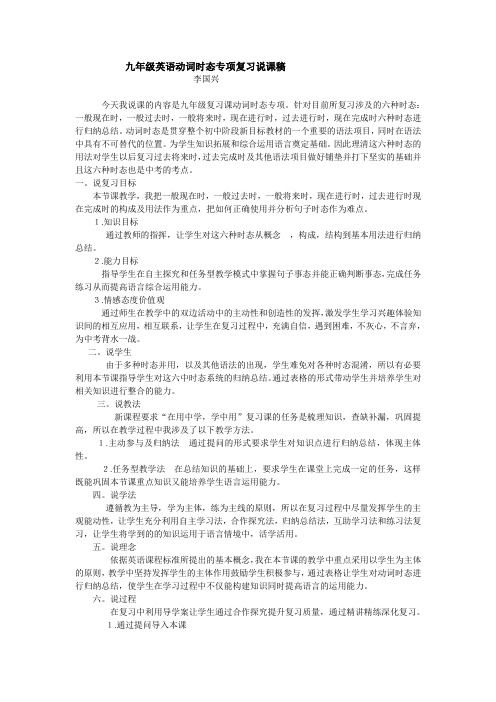人教版初三英语教案-中考总复习动词时态一 基础讲解
九年级英语专题复习教案动词

九年级英语专题复习教案——动词一、教学目标1. 知识与技能:(1)掌握动词的分类及用法;(2)能够正确运用动词形式进行句子构建;(3)理解动词在语境中的意义及搭配。
2. 过程与方法:(1)通过实例分析,引导学生掌握动词的分类;(2)通过练习,提高学生运用动词形式的能力;(3)通过小组讨论,培养学生合作学习的能力。
3. 情感态度与价值观:激发学生对英语动词的学习兴趣,培养积极主动探究的精神;培养学生运用英语进行交际的能力,提高学生的语言运用水平。
二、教学重难点1. 教学重点:(1)动词的分类及用法;(2)动词形式的运用;(3)动词在语境中的意义及搭配。
2. 教学难点:(1)动词不定式、分词形式的运用;(2)动词短语的识别及搭配;(3)动词在特定语境中的意义及用法。
三、教学方法1. 情境教学法:通过设置各种真实的语境,让学生在实际情境中学习、运用动词;2. 任务型教学法:设计各种任务,让学生在完成任务的过程中,提高运用动词的能力;3. 小组合作学习:引导学生分组讨论,共同探究动词的用法,培养学生的合作意识。
四、教学过程1. 导入:通过提问方式引导学生回顾已学过的动词知识,为新课学习做好铺垫;2. 讲解:讲解动词的分类、用法及动词形式的变化;3. 练习:设计各种练习题,让学生在实践中掌握动词的用法;4. 拓展:介绍动词的搭配及语境意义,引导学生学会运用;5. 总结:对本节课的内容进行总结,强调重点知识。
五、课后作业1. 整理本节课所学的动词知识点,形成笔记;2. 完成课后练习题,巩固所学知识;3. 搜集动词搭配的实例,进行学习交流。
六、教学评价1. 课堂表现:观察学生在课堂上的参与程度、提问回答等情况,了解学生的学习状态;2. 练习完成情况:检查学生课后练习的完成质量,评估学生对动词知识的掌握程度;3. 小组讨论:评价学生在小组合作学习中的表现,包括交流、合作、探究等方面;4. 课后反馈:收集学生的学习反馈,了解学生在学习过程中遇到的问题,为下一步教学提供参考。
2023年中考复习教案人教版英语九年级全册Unit1时态

中考复习1、掌握Unit1知识点归纳。
2、复习一般现在时、一般过去时、一般将来时、现在进行时、过去进行时以及现在完成时,掌握基础中考题型。
1、不同时态的结构、关键词以及用法区别。
2、by+doing sth 表示做某事的方式、方法、途径,翻译成通过3、The+比较级,the+比较级4、so---that---如此--以至于---引导结果状语从句so that 目的是引导目的状语从句5、even if 和unlessUnit 1.How can we become good learners?一、重点单词名词(n.)conversation(s) 谈话交谈pronunciation 发音读音expression 表情表达secret 秘密秘诀physics 物理chemistry 化学speed 速度ability 能力brain 大脑attention 注意动词(v.) discover 发现repeat 重复memorize 记忆记住pronounce 发音increase 增加增长create 创造connect (使)连接review 回顾复习形容词副词(adj./adv.)aloud 大声地patient 有耐心的/病人born 天生的active 积极的wisely 明智地lifelong 终身的二、重点知识点1.ask的用法(课文:by asking the teacher for help)ask(sb)for help----I study by asking my classmates for helpask sb (not)to do让某人做(不做)某事------He asked her to stay with him.2.have conversations with sbin+语言表示用某种语音------Please speak it in Chinese.eg: Do you have conversations with your friends in English(用英语)?3.What about+doing?=How about doing? =Why not do?=Why don’t you do?都是用来提建议的句型eg:What about listening to tapes?4.a little 有一点儿后+形容词-------I’m a little nervous.= kind of后+不可数名词------There is a little water in the bottle.5.finish doing sth 完成做某事give a report 作报告类似:practice doing sth-------How do you practice speaking?eg:I have to finish reading a book and give a report next Monday.6.word by word 一个字一个字地by 表示连续或者反复one by one 一个接一个step by step 一步一步地year by year 年复一年little by littleeg:Don’t read word by word .They went out of the classroom one by one.7.be afraid to do 对做某事内心感到恐惧be afraid of (doing) 害怕(做)… (内心不情愿)eg:I was afraid to ask questions because of my poor pronunciation。
中考英语动词的复习教案

中考英语动词复习教案一、教学目标:1. 知识目标:(1)掌握动词的时态、语态、语气以及非谓语动词的用法。
(2)了解动词短语的常见搭配。
(3)熟练运用情态动词表达可能性、义务和禁止。
2. 能力目标:(1)能正确运用动词的时态、语态、语气和非谓语动词进行句子表达。
(2)能运用动词短语和情态动词完成句子和对话。
3. 情感目标:培养学生的学习兴趣,提高自信心,增强合作意识。
二、教学内容:1. 动词的时态:一般现在时、一般过去时、一般将来时、现在进行时、过去进行时、现在完成时、过去完成时、将来完成时。
2. 动词的语态:被动语态和主动语态。
3. 动词的语气:陈述语气、疑问语气、祈使语气、感叹语气。
4. 非谓语动词:动名词、分词、不定式。
5. 动词短语:常见的动词短语及其搭配。
6. 情态动词:can、may、must、should、will等的情态动词用法。
三、教学重点与难点:1. 重点:动词的时态、语态、语气和非谓语动词的用法。
2. 难点:动词短语的搭配和情态动词的辨析。
四、教学方法:1. 任务型教学法:通过完成任务,让学生在实践中掌握动词的用法。
2. 情境教学法:创设真实的语境,让学生在情境中学习动词。
3. 合作学习法:引导学生分组讨论,相互交流,提高合作能力。
五、教学过程:1. 导入:通过播放一段视频或音频,引导学生关注动词在实际语境中的运用。
2. 呈现:用PPT展示动词的时态、语态、语气和非谓语动词的图片,让学生观察并回答相关问题。
3. 讲解:讲解动词的时态、语态、语气和非谓语动词的用法,举例说明。
4. 练习:设计相关的练习题,让学生进行课堂练习,及时巩固所学知识。
5. 拓展:介绍动词短语的常见搭配,让学生进行实际操作,运用所学知识。
7. 作业布置:布置相关的作业,让学生课后巩固所学知识。
8. 反馈与评价:及时对学生的学习情况进行反馈,鼓励优秀学生,帮助后进生。
六、教学评估1. 课堂参与度:观察学生在课堂上的参与情况,包括发言、讨论、练习等。
英语人教版九年级全册动词时态(教学设计)

动词时态(教学设计)一、教学内容六种动词时态二、教学目标(一)复习六种时态的定义,构成规则(二)能正确的运用动词的三种时态三、重点难点(一)初中英语动词六种时态的定义、规则(二)初中英语动词六种时态的用法四、教学过程(一)动词的时态在英语中,由于谓语动词发生的时间不同,或表达不同时间存在的状态,谓语动词都要发生相应的变化,这些动词的形式就叫做动词的时态。
英语共有16种时态,现阶段学生已学习6种。
现以动词do为例,将这6种时态构成列表如下:①现在:一般现在时:①do ②does;现在进行时:am/is/are doing;现在完成时:has/have done②过去:一般过去时:did;过去进行时:was/were doing③将来:一般将来时:①am/is/are going to do ②will/shall do1.一般现在时:(1)构成:①动词原形②动词第三人称单数形式(2)形式:①be动词:肯定句:主语+am/is/are+表语(n./pron./adj.)eg:I am/I’m a student. You are/You’re a student. He is/He’s/She is/She’s a student.否定句:主语+am/is/are+not+表语(n./pron./adj.)eg:I am not/I’m not a student. You are not/You’re not/You aren’t a student.疑问句:Am/Is/Are+主语+表语(n./pron./adj.)eg:Am I a student? Are you a student? Is he/she a student? Is it an apple?②其它动词:肯定句:主语+动词原形/第三人称单数形式(+宾语)(+状语)eg:I/You/We/You/They study English every day.否定句:主语+don’t/doesn’t(第三人称单数)+动词原形(+宾语)(+状语)eg:I/You/We/You/They don’t study English every day.疑问句:Do/Does+主语+动词原形(+宾语)(+状语)eg:Do I/You/We/You/They study English every day?(3)用法:①表示经常发生的动作或现在存在的状态eg:I go to school every day except Sunday.除了星期日,我每天都上学。
英语知识点-中考英语动词时态讲义中考复习教案人教新目标版【精选教案】

________________________________________________________
4、 I like being a nurse for the old.
(变成一般疑问句)
________________________________________________________
例如 : He often goes swimming in summer.
他夏天经常游泳。
I usually leave home for school at 7 every morning.
每天早上我七点离开家。
2)表示现在的状态。
例如: My father is at work.He is very busy.
swim
swims
以字母 s,x,ch,sh,o 结尾的词加
pass
passes
-es ,读∕ iz ∕, 如果动词原形词
fix
fixes
尾已有 e, 则只加 -s 。
teach
teaches
wish
wishes
do
does
以辅音字母加 y 结尾的词,先变
study
studies
y 为 i, 再加 -es, 读∕ z∕。
等。 火车明天上午六点开。
He comes back tonight.
他今晚回来。
6)在复合句中,当主句是一般将来时,时间或条件状语从句的谓语动词只能用一般现在时来表示
将来要发生的动作。
例如: I'll tell him the news when he comes back.
他回来时,我将告诉他这个消息。
If you take the job , they will talk with you in greater details.
九年级英语动词时态专项复习说课稿

九年级英语动词时态专项复习说课稿李国兴今天我说课的内容是九年级复习课动词时态专项。
针对目前所复习涉及的六种时态:一般现在时,一般过去时,一般将来时,现在进行时,过去进行时,现在完成时六种时态进行归纳总结。
动词时态是贯穿整个初中阶段新目标教材的一个重要的语法项目,同时在语法中具有不可替代的位置。
为学生知识拓展和综合运用语言奠定基础。
因此理清这六种时态的用法对学生以后复习过去将来时,过去完成时及其他语法项目做好铺垫并打下坚实的基础并且这六种时态也是中考的考点。
一。
说复习目标本节课教学,我把一般现在时,一般过去时,一般将来时,现在进行时,过去进行时现在完成时的构成及用法作为重点,把如何正确使用并分析句子时态作为难点。
1.知识目标通过教师的指挥,让学生对这六种时态从概念,构成,结构到基本用法进行归纳总结。
2.能力目标指导学生在自主探究和任务型教学模式中掌握句子事态并能正确判断事态,完成任务练习从而提高语言综合运用能力。
3.情感态度价值观通过师生在教学中的双边活动中的主动性和创造性的发挥,激发学生学习兴趣体验知识间的相互应用,相互联系,让学生在复习过程中,充满自信,遇到困难,不灰心,不言弃,为中考背水一战。
二。
说学生由于多种时态并用,以及其他语法的出现,学生难免对各种时态混淆,所以有必要利用本节课指导学生对这六中时态系统的归纳总结。
通过表格的形式带动学生并培养学生对相关知识进行整合的能力。
三。
说教法新课程要求“在用中学,学中用”复习课的任务是梳理知识,查缺补漏,巩固提高,所以在教学过程中我涉及了以下教学方法。
1.主动参与及归纳法通过提问的形式要求学生对知识点进行归纳总结,体现主体性。
2.任务型教学法在总结知识的基础上,要求学生在课堂上完成一定的任务,这样既能巩固本节课重点知识又能培养学生语言运用能力。
四。
说学法遵循教为主导,学为主体,练为主线的原则,所以在复习过程中尽量发挥学生的主观能动性,让学生充分利用自主学习法,合作探究法,归纳总结法,互助学习法和练习法复习,让学生将学到的的知识运用于语言情境中,活学活用。
九年级英语专题复习教案动词

一、教案主题:九年级英语专题复习教案动词二、教学目标:1. 理解动词的分类及用法。
2. 掌握动词的时态、语态和语态的转换。
3. 提高学生运用动词进行交际的能力。
三、教学内容:1. 动词的分类:行为动词、助动词、情态动词。
2. 动词的时态:一般现在时、一般过去时、一般将来时、现在进行时、过去进行时、将来进行时。
3. 动词的语态:主动语态、被动语态。
4. 语态的转换:主动语态转为被动语态,被动语态转为主动语态。
四、教学过程:1. 导入:通过图片和场景,引出动词的概念,激发学生的学习兴趣。
2. 讲解:讲解动词的分类、时态、语态及语态的转换。
3. 互动:学生分组讨论,举例说明动词的用法,进行动词接龙游戏。
4. 练习:设计练习题,让学生运用动词进行句子的编写和翻译。
5. 总结:对本节课的内容进行总结,强调重点和难点。
五、课后作业:1. 复习本节课所学内容,整理笔记。
2. 完成课后练习题,巩固所学知识。
3. 结合日常生活,尝试运用动词进行交际。
六、教案主题:九年级英语专题复习教案动词——一般现在时七、教学目标:1. 掌握一般现在时的构成和用法。
2. 能够正确运用一般现在时描述经常性和习惯性的动作。
3. 提高学生在实际情境中运用一般现在时的能力。
八、教学内容:1. 一般现在时的构成:主语+ 动词原形。
2. 一般现在时的用法:描述经常性和习惯性的动作、状态、特点等。
3. 一般现在时的特殊句式:there be句型、疑问句、否定句。
九、教学过程:1. 导入:通过图片和场景,引导学生回顾一般现在时的概念。
2. 讲解:讲解一般现在时的构成、用法和特殊句式。
3. 互动:学生分组讨论,举例说明一般现在时的用法,进行一般现在时的句子接龙游戏。
4. 练习:设计练习题,让学生运用一般现在时进行句子的编写和翻译。
5. 总结:对本节课的内容进行总结,强调重点和难点。
十、课后作业:1. 复习本节课所学内容,整理笔记。
2. 完成课后练习题,巩固所学知识。
初中英语人教版动词时态教案

初中英语人教版动词时态教案一、教学目标1. 理解英语动词时态的概念和作用;2. 掌握一般现在时、一般过去时、一般将来时的基本用法;3. 能够正确运用所学时态进行句子造句。
二、教学重点1. 一般现在时、一般过去时、一般将来时的用法;2. 时态转换的规则及注意事项。
三、教学难点1. 时态转换的特殊规则;2. 动词时态的正确使用。
四、教学准备1. 教材:人教版初中英语教材;2. 多媒体设备。
五、教学过程Step 1:导入新知(5分钟)教师通过展示一段描述现在活动的句子,并提问学生目前进行到哪一个时刻的活动,引导学生思考不同时态所表达的时间概念。
示例:教师展示句子:"He plays football every Saturday."教师提问:"What does he do every Saturday?"Step 2:引入新知(10分钟)教师出示一张包含不同时态的表格,并解释每个时态的用法和表示的时间概念。
同时,通过例句演示不同时态的基本结构和关键词。
示例:一般现在时:主语 + 动词原形例句:She often eats fruit.关键词:often, always, sometimes一般过去时:主语 + 动词过去式例句:They watched a movie yesterday.关键词:yesterday, last week, ago一般将来时:主语 + will + 动词原形例句:I will visit my grandparents next week.关键词:next week, in the futureStep 3:练习时态转换(15分钟)教师给出一些句子,要求学生将其转换成其他时态。
学生通过思考和讨论,运用所学的知识进行转换。
示例:1. They go swimming every Sunday.(一般过去时)2. He will go to the park tomorrow.(一般现在时)3. She ate an apple just now.(一般将来时)Step 4:巩固练习(15分钟)教师分发练习题或板书习题,要求学生根据所给的语境写出正确的时态形式。
- 1、下载文档前请自行甄别文档内容的完整性,平台不提供额外的编辑、内容补充、找答案等附加服务。
- 2、"仅部分预览"的文档,不可在线预览部分如存在完整性等问题,可反馈申请退款(可完整预览的文档不适用该条件!)。
- 3、如文档侵犯您的权益,请联系客服反馈,我们会尽快为您处理(人工客服工作时间:9:00-18:30)。
动词时态一责编:王晓丽【真题再现】1. — What are you busy doing these days, Mr. Zhao? (2014 山西)— I __________ my newborn baby. You can’t imagine how busy I am!A. look afterB. looked afterC. am looking after2. —Tina, breakfast is ready. Dad cooked it for us. (2014 黄冈)—It can’t have been Father. He __________ early on Sundays.A. always gets upB. often got upC. had got upD. never gets up3.My husband always __________ me flowers every week before we got married, but now he never ________. (2014 呼和浩特)A.sends; does B.sent; does C.was going to send; do D.sent; do4. Robots __________ more heavy work for us in the future. (2014 天津)A. will doB. didC. have doneD. were doing5.Look! Some visitors __________ for the bus over there. (2015 南宁)A.are waiting B.is waiting C.waiting D.wait6. — Mum, where is Dad? (2015 北京)— He _________ flowers in the garden now.A. plantedB. plantsC. will plantD. is planting7.Do you think __________ a meeting tomorrow afternoon? (2015 宁夏回族自治区) A.is there B.there is C.there was D.there is going to be8. Many city people ___________ their bikes to work every day. (2015 陕西)A. rideB. will rideC. rodeD. have ridden9. —Why didn’t you buy any bread? (2015 重庆)— Sorry, I __________.A. forgetB. forgotC. rememberD. remembered10.Don’t disturb Allen now.He __________ for the Spelling Bee competition. (2015 广东) A.prepares B.prepared C.is preparing D.will prepare 【答案与解析】1. C。
句意:——最近你在忙着做什么,赵先生?——我在照顾我的新生儿。
你无法想象我有多忙!由题干中的are you busy doing可知应用现在进行时,故答案为C项。
2. D。
句意:――Tina,早饭好了,爸爸为我们做的。
――不可能是爸爸。
他在周日从来不会早起。
由on Sundays可知泛指在周日,应该使用一般现在时态,又由语境可知应选D 项。
3. B。
句意:在我们结婚前我丈夫总是每周送花给我,但现在再也不送了。
由before wegot married可知第一设空处应用一般过去时;由now可知第二设空处用一般现在时,又因为主语he为第三人称单数,故选B项。
4. A。
此题最后有明显的一般将来时标志“in the future”,故选A。
5. A。
由“Look!”可知,应用现在进行时;“s ome visitors”作主语,谓语动词应用复数形式,故选A。
6. D。
句意:——妈妈,爸爸在哪儿?——他正在花园里种花。
根据答语时间状语now 可知应选用现在进行时,故选D。
7. D。
根据“tomorrow afternoon”可知,应用一般将来时;there be结构的将来时为there isgoing to be/there will be,故选D。
句意为:你认为明天下午会开会吗?8. A。
句意:许多市民每天骑车去上班。
根据时间状语every day可知,描述的是通常的动作,应该用一般现在时,故选A。
9. B。
句意:——为什么你不买一些面包呢?——对不起,我忘了。
上句为一般过去时,所以答语也要用一般过去时。
根据题意可知答案为B项。
10. C。
句意为:现在不要打扰Allen。
他正在准备拼写比赛。
根据语境可知,表示某个时刻正在进行的动作应用进行时;根据“now”可知,应该是现在进行时。
故选C。
【用法讲解】考试要求:英语的动词的时态共有十六种,但是中考常考的主要有八种,一般现在时、一般过去时、一般将来时、现在进行时、现在完成时、过去进行时、过去将来时,过去完成时等时态的构成和用法。
本节先讲述一下一般现在时,一般过去时、一般将来时和现在进行时。
1. 一般现在时一般现在时的构成:一般现在时主要用动词原形表示,如果主语是第三人称单数,一般在动词原形后加-s或-es。
例如:I have breakfast at 7 every morning. 我每天早晨7点吃早餐。
He goes swimming on Sundays. 每周日他都去游泳。
一般现在时的用法:(1)表示经常发生的动作或者经常存在的状态。
经常和表示时间的状语often,always,usually,sometimes,every day等连用。
例如:My sister usually goes to school on foot.我姐姐经常步行去上学。
We often come to school at six in the morning.我们经常在早上六点到学校。
(2)表示某种习惯或者能力,也可以表示职业、特征等。
例如:My mother often gets up very early in the morning.我的妈妈经常在早上起床很早。
This kind of car runs very fast.这种小汽车跑得非常快。
(3)表示客观事实、客观规律或者客观真理。
例如:This kind of trees never grows in the desert.这种树从来不在沙漠里生长。
Do you know that knowledge is power?你知道知识就是力量吗?(4)在时间、条件、让步等状语从句中,表示将来的动作。
例如:They’ll be so happy when I tell them.我告诉他们时,他们会很高兴的。
If you aren’t here on time tomorrow, I’ll write to your parents.如果你明天不准时到,我就给你父母亲写信。
注意:(1)一般现在时的第三人称单数:在一般现在时中,如果句子的主语是第三人称单数形式,谓语动词用其第三人称单数形式。
例如:My father often watches TV after dinner at home.我的爸爸经常在晚饭后在家看电视。
(2)一般现在时的谓语如果是实义动词,其否定句和一般疑问句要用助动词do,如果主语是第三人称单数时,要用does,doesn’t来构成。
例如:My little brother doesn’t do his homework at school.我的小弟弟不在学校做家庭作业。
2. 一般过去时一般过去时的构成:一般过去时用动词的过去式表示。
Last week Tom made a model plane with his friend Jack.上周汤姆和他的朋友杰克做了一个飞机模型。
Tom was at home yesterday. 汤姆昨天在家。
一般过去时的用法:(1)表示过去经常发生的动作或者过去经常存在的状态。
常与表示过去的时间状语yesterday,just now,a moment ago,last week/ year/ night,in 1985,in those days,when I was at middle school等连用。
例如:They went to college last year. 他们是去年上大学。
We had a good time in the park yesterday. 我们昨天在公园玩得很高兴。
(2)表示过去接连发生的一系列动作。
例如:We played football first,then went boating and fishing,,and at last had a picnic there.我们先踢足球,然后去划船、钓鱼。
最后我们在那里野餐。
注意:(1)表示过去经常或反复的动作,而现在却不这样做了,也可以用used to +动词原形来表示。
例如:I used to get up very late. 我过去总是起床很晚。
(2)如果主句的谓语动词是现在完成时,since引导的时间状语从句用一般过去时。
例如:We have made a lot of friends since we came here.自从我们来到这里以来已经交了很多的朋友。
(3)谈论某人的出生日期经常用一般过去时。
例如:—When were you born? 你是什么时候出生的?—I was born in 1983. 我出生于1983年。
3. 一般将来时一般将来时的构成:(1)will/shall+动词原形, 其中shall常用于第一人称的疑问句。
(2)be going to+动词原形。
例如:What are you going to do next Sunday?下周日你打算做什么?I’ll come and help you tomorrow. 我明天来帮助你。
Shall we go to the zoo? 我们去动物园好吗?一般将来时的用法:表示将来发生的动作或者存在的状态。
常和表示将来的时间状语,如tomorrow,next week/ year/ month,this afternoon/ evening,tonight,in a few days,when he comes等连用。
